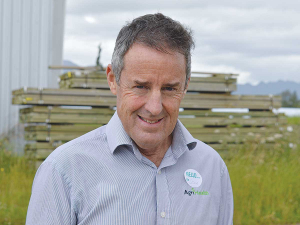Understanding udder health
Last month we talked about why dry cow management is critical, though often overlooked. This month I wanted to dive further into the dry period’s importance to udder health.
 Steve Cranefield, AgriHealth, says mastitis remains the biggest animal health issue in the dairy industry and farmers should take more pride in tackling mastitis.
Steve Cranefield, AgriHealth, says mastitis remains the biggest animal health issue in the dairy industry and farmers should take more pride in tackling mastitis.
Mastitis expert Steve Cranefield is urging farmers to take more pride in lowering their herd’s somatic cell count.
Cranefield made the comments at a Smaller Milk and Supply Herds (SMASH) field day at Tania White’s farm, at Te Aroha, last month.
White’s farm recorded an average somatic cell count of 31,180 – the second lowest among Fonterra suppliers’ last season. She was pipped by her parents Graham and Glenys Bell, who farm up the road and recorded an average SCC of 30,050.
Cranefield, who spoke at the field day, gave the Bells and White a big tick for handling SCC, produced by a cow to fight mastitis.
“They are some of the best in the country,” he told Dairy News.
“There’s a huge element of pride involved; they know they produce the cleanest milk in the country.”
Cranefield says mastitis remains the biggest animal health issue in the dairy industry and farmers should take more pride in tackling mastitis.
He says there are a lot of benefits in keeping SCC down in cows – such as production gains and lower vet costs.
“Every time you treat cows, it costs you hundreds of dollars … financially it stacks up and production wise there is an element of pride.”
Graham Bell told the field day that it’s down to getting the basics right every time.
“There’s no secret, it’s just about doing a good job and paying close attention to detail. We love our stock and want them to be as healthy as possible so we look after them as well as we can,” he says.
“Getting the basics right through our hygiene practices, during the calving period and with our testing means we have a consistently low cell count where the milk quality is better and we have healthier cows.”
Cranefield says key things done by the Bells and Tania White set the cows up well for the next season using a combination of dry cow therapy and teat sealant on cows.
“Right from day one they are focused on mastitis: they are collecting cows in calves twice a day so freshly calved cows are getting milked straight away,” he explains. “Their focus right at start is on improving teat condition so they put teat spray on the colostrum cows before they milk them and repeat after milking.
“Right from start not allowing any spread of infection.”
Coming in at a year-end total at 3088 units, a rise of around 10% over the 2806 total for 2024, the signs are that the New Zealand farm machinery industry is turning the corner after a difficult couple of years.
New Zealand's animal health industry has a new tool addressing a long-standing sustainability issue.
The Government has announced that ACC will be a sponsor of this year's FMG Young Farmer of the Year competition.
As veterinary student numbers grow to help address New Zealand's national workforce shortge, Massey University's School of Veterinary Science is inviting more veterinary practices to partner in training the next generation of vets.
South Island dairy farmers will soon be able to supply organic milk to Fonterra.
Norwood has announced the opening of a new Tasman dealership at Richmond near Nelson next month.
OPINION: There will be no cows at Europe's largest agricultural show in Paris this year for the first time ever…
OPINION: Canterbury grows most of the country's wheat, barley and oat crops. But persistently low wheat prices, coupled with a…